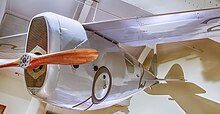| RB-1 Racer | |
|---|---|

| |
| Role | Racing aircraftType of aircraft |
| Manufacturer | Dayton-Wright |
| Designer | Howard Max Rinehart, Milton C. Baumann, Charles Hampson Grant |
| First flight | 1920 |
| Number built | 1 |
| Variants | Dayton-Wright XPS-1 |
The Dayton-Wright RB-1 (Rinehart Baumann model one), also known simply as the Dayton-Wright Racer was a high wing single-engine monoplane racing aircraft developed in the United States to participate in the 1920 Gordon Bennett Cup air race.
Design and development
The RB-1 was a high-wing monoplane with a monocoque fuselage and cantilever wing built around a solid balsa wood core laminated with plywood and covered in linen that incorporated a mechanism designed by Charles Hampson Grant to vary its camber in flight by adjusting the angles of the leading and trailing edges, with the trailing edge being a plain flap, and the leading edge functioning similarly. The aircraft also featured a retractable undercarriage operated by a hand-crank making it one of the first instances of undercarriage retraction for aerodynamic benefit alone. The propeller shaft was mounted through a large oval radiator. The pilot had no forward view, but was provided with flexible celluloid side windows. Cockpit access was through a hatch in the top of the fuselage. A prototype was built using non-retractable gear and strut-braced wings. A shorter tapered "racing wing" was installed afterward with leading and trailing edge flaps interconnected with landing gear deployment. The mechanisms and hinges for the wing flaps were exposed across the top of the solid wing. The racing wing produced directional instability requiring small tail fins to be added.
Operational history

Dismantled and shipped to France, the RB-1 was flown by Howard Rinehart in the 28 September 1920 race, but was forced to withdraw after a cable failure prevented retraction of the gear/flap mechanism, allowing the two Nieuport-Delage NiD.29V racers to make a one-two finish. After the race it was returned to the United States, and is now preserved at the Henry Ford Museum in Dearborn, Michigan. Many of the aircraft's advanced features were incorporated into a prototype fighter, the XPS-1.
Variants
- Dayton-Wright XPS-1 - A 1921 Pursuit aircraft using the RB landing gear design.
Specifications
Data from 1921 Aircraft Yearbook
General characteristics
- Crew: One pilot
- Length: 22 ft 8 in (6.91 m)
- Wingspan: 21 ft 2 in (6.45 m)
- Wing area: 102.74 sq ft (9.545 m)
- Empty weight: 1,400 lb (635 kg)
- Gross weight: 1,850 lb (839 kg)
- Powerplant: 1 × Hall-Scott L-6a , 250 hp (190 kW)
Performance
- Maximum speed: 190 mph (310 km/h, 170 kn)
- Range: 275 mi (443 km, 239 nmi)
- Service ceiling: 15,000 ft (4,600 m)
See also
- 1920 in aviation (first flight)
Related development
Aircraft of comparable role, configuration, and era
Related lists
References
Notes
- Howard Max Rinehart, flight instructor and later, aeronautical engineer.
- Milton C. Baumann, a US Army officer who was an aeronautical engineer during WW1.
Citations
- "Biography of Charles Hampson Grant" (PDF). Academy of Model Aeronautics. 2017.
- King, H. F. (11 December 1953). "The First Fifty Years". Flight. Vol. 64, no. 2342. p. 762. Archived from the original on 23 October 2014. Retrieved 10 May 2021.
{{cite magazine}}: CS1 maint: unfit URL (link) - Wegg 1990, p.30.
- ^ Eberspacher, Warren (April 2000). "The Dayton-Wright RB-Racer". Skyways.
- "The Dayton-Wright monoplane". Flight. 12 (615): 1058. 7 October 1920.
- Margoulis, W. (April 1921). "The Gordon Bennett Aeroplane Cup, 1920". National Advisory Committee for Aeronautics Technical Note. 50. National Advisory Committee for Aeronautics: 2–4.
Bibliography
- Wegg, John (1990). General Dynamics Aircraft and their Predecessors. London: Putnam. ISBN 0-85177-833-X.
- O'Leary, Michael (November 2003). "Dayton-Wright RB-1". Air Classics.
- Taylor, Michael J. H. (1989). Jane's Encyclopedia of Aviation. London: Studio Editions. p. 305.
External links
| Dayton-Wright aircraft | |
|---|---|